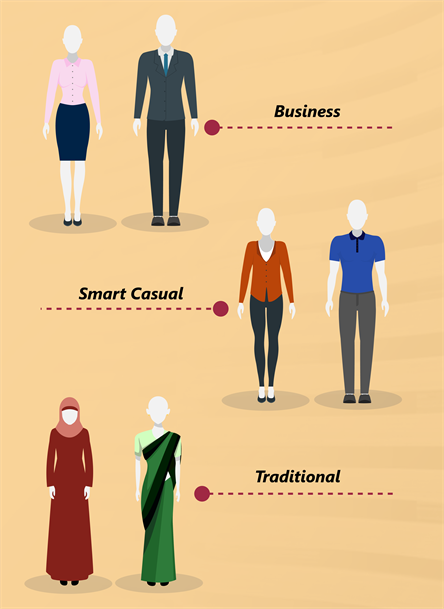Guide to attending court
Who can attend court sessions
Any member of the public may attend open court hearings in the Supreme Court or State Courts. These have limited seats and are available on a first-come, first-served basis. Hearings conducted using Zoom will be streamed on TV screens in the courtrooms.
View the list of upcoming hearings.
Cases that are conducted in chambers or in camera (Latin for "in private") are not open to the public. These cases include all Family Justice Courts (FJC) proceedings. Only parties involved in the case may attend, unless the court permits.
Hearings in chambers and hearings in camera are not the same.
- A hearing in chambers takes place in either a judge's or a registrar’s chambers, which is not open to members of the public. Pre-trial conferences and interlocutory matters are usually heard in chambers.
- The court hears proceedings in camera in the interests of justice, public safety, public security or propriety, or for any other sufficient reason. Such proceedings include all FJC cases and some cases in the State Courts and Supreme Court.
When visiting the courts
Before visiting the courts, find out about how to get to the courts and the operating hours. You can also view a floor-by-floor directory to locate where you need to go.
The guide to attending court video series also provides more information on visiting the courts.
Activities including advertising, soliciting and/or touting are prohibited on the court premises.
Security check is mandatory
You will need to undergo a security screening before entering the court buildings. This screening is similar to that at airports.
When you enter, you will walk through a metal detector. Your belongings, including all food and drinks, will be screened via X-ray machines.
Examples of items that are not allowed into the court buildings include:
- Weapons, dangerous items and prohibited tobacco products as listed on the Health Sciences Authority website, including e-cigarettes. You will be referred to the police if you have these items.
- Sharp objects such as scissors, pen knives and card knives.
- Flammable items such as aerosol sprays.
- Recording devices such as cameras, video cameras and voice recorders. You will be asked to leave such devices at the security counter when you enter.
This list of prohibited items is not exhaustive. The security personnel will inform you if you have items that you must deposit at the security counter.
Mobile phones are allowed, but the camera function must not be activated within the premises unless specified (for example, for scanning QR codes).
Dress code
You should be properly attired in business wear, smart casual wear or traditional dress.

Visitors who are dressed in a manner that is deemed by the courts to be inappropriate, indecent or offensive, may not be allowed to enter the court buildings, courtroom or chambers.
Court conduct
Follow these ground rules when attending a court session:
You should... | You should not... |
|---|---|
|
|
If you misbehave or fail to comply with the rules, the judge may order you to leave.
Additional guidelines:
- If you are a visitor, you must be silent at all times during the court session and are not allowed to address the court.
- You may use notebooks, tablets, mobile phones and other electronic devices to carry out the following activities, provided that such use does not disrupt or trivialise the proceedings:
- Take notes of evidence and for other purposes pertaining to the proceedings.
- Communicate with external parties for all hearings in open court.
- You are advised not to bring young children such as infants into the courtroom.


Need help?
The information here is for general guidance as the courts do not provide legal advice. If you need further help, you may seek independent legal advice or community resources.
Find out moreResources
Legislation associated with this topic includes:
Related questions
Public access to a courtroom is based on first-come, first-seated basis. The courtroom will open 30 minutes before the hearing starts.
For cases of high public interest that are likely to attract a larger than usual turnout, queue poles may be set up outside the State Courts to manage the crowd and facilitate orderliness. There will be a limit to the number of seats allocated to members of the public, as individuals such as prosecutors, defence counsel, court interpreters or family members of the persons charged in court will be given priority.
The State Courts will issue a special pass to members of the public who wish to observe the proceedings. The passes will be issued outside the State Courts on each day of the trial, before the hearing starts. The passes are transferrable.
When all the passes (for the morning or afternoon) are issued, members of the public will be notified that the courtroom is full. There will be no entry into the State Courts until further notice. This is to comply with the occupancy load of the building and the fire safety regulations.








